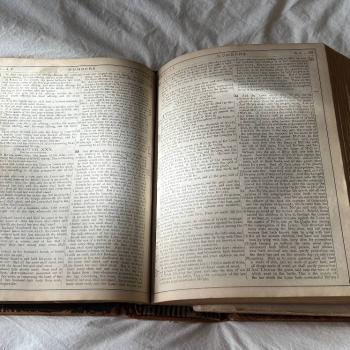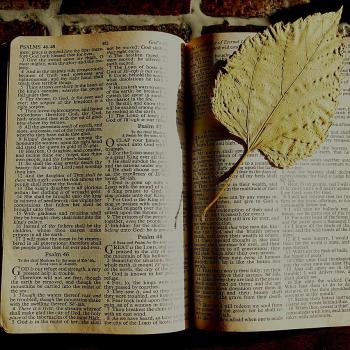Lectionary Reflections
1 Kings 8:1, 6, 10-11, 22-30, 41-43
August 23, 2015
13th Sunday After Pentecost
August 23, 2015 happens to be my 46th wedding anniversary. Diana and I were hitched in the Stafford, Kansas United Methodist Church (it had been "United Methodist" only one year at that point; the sign out front had yet to change) by a recent seminary graduate friend, attended by seven of my buddies and brothers and seven of her dearest friends and sisters. It was, I imagine, the grand event of the season (if Stafford had any seasons, save planting and harvest) in the town, with about a sixth of the population in attendance. I was to be ordained a Deacon in the UMC the very next year, back in the days when being a Deacon in the denomination meant one was on the way to full ordination as an Elder. Those days are long gone now. Deacons in the UMC are a whole different breed of cat now.
I assume you are at this moment wondering what, if anything, my wedding anniversary has to do with 1 Kings 8 and Solomon's lengthy prayer at the consecration of the temple of Jerusalem. The temple was finished sometime around 950 B.C.E. or so, nearly 3000 years in the past, and has now joined so many of its counterparts, collapsed into the dust of the ages. I suppose the answer to that quite reasonable question is a complex one, but one I hope it will illuminate something for you as you ponder what to do with this chapter in a sermon in 2015.
The answer is intertwined with the strange and fascinating ways that my ministerial life has evolved over the forty-five years of my ordination to be a member of the clergy and conjoined with the ministerial life of my wife over the past twenty-five years of her ordination. Yes, she left a music and dance ministry, as a laywoman for some twenty years, entered the seminary where I had taught for ten years, and graduated to her own ordination in 1990. She was even one of my students, if you can imagine it, meaning among other things that she and I were breaking strict university policy by sharing a bed while sharing a classroom. I trust our intimacies did not influence her grade in my class, but fortunately she was an extremely good student in every way. She went on to have a very diverse pastoral ministry in North Texas, serving six varied appointments before her own retirement four years ago.
Okay, I am coming to the answer to your question! Be patient! Since both of us raised our two children, while at the same time wallowing in the theological world, I in academia and she in the parish, discussions of theology and practice were ubiquitous in our house, around our table, usually to the horror and consternation of our two children, who were too often forced to listen to us wax theological, an activity that drove them to their rooms, and later, to borrow the car to escape — anywhere but there!
Our discussions, which have not ceased in our retirements, even as those children have gone on to their own fascinating lives (albeit in Los Angeles, CA, about as far as they can get from us — is there a connection, do you imagine?). Two grandchildren draw us there with regularity, but theology is not spoken in their homes; it is now confined to late-night musings as Diana and I drift asleep.
Finally, perhaps, to the answer! Our discussions have regularly, especially over the past fifteen years of our time together, moved toward questions of the person of the theologian. Just who is the person who is preaching or teaching or counseling? We do discuss theological beliefs, but we regularly turn toward theological personhood. Who am I and who are you? And that brings us to 1 Kings 8 — at last, I hear you sigh! Just who is this Solomon who is praying at the consecration of the temple. It will not do, finally, to separate this very pious Solomon from that son of David, who slaughtered and deceived his way to the established throne of Israel, that Solomon we saw last week, who banished Abiathar, and had Joab and Shemei murdered at the express command of his dying father.
I know full well that the author who wrote the tales from 1 Kings 1-2, filled with mayhem and blood, was clearly not the author who wrote 1 Kings 8. This writer today has drunk from the Deuteronomic cup to the dregs and his provided for us the very model of the pious king, praying to the mighty YHWH, prostrating himself before the mysterious Ark of the Covenant that he has ensconced in the splendid new building, offering rich and aromatic sacrifice to the God of Israel. The prayer is filled with Deuteronomic language, promising reward to all those who act in the right ways and destruction to those who do not. It presents a very simple way to evaluate the actions of humanity, a way that his been completely belied by the very long and tortuous stories of Solomon and his father that have preceded it. How are we to take finally with any seriousness the prayer of the murdering Solomon, asking YHWH to "judge your servants, condemning the guilty by bringing their conduct on their own head," when the one who prays by this standard ought to be judged as foul sinner, deposed as king, and thrown out of the kingdom? Can the foulest of sinners actually pray to YHWH at all?





